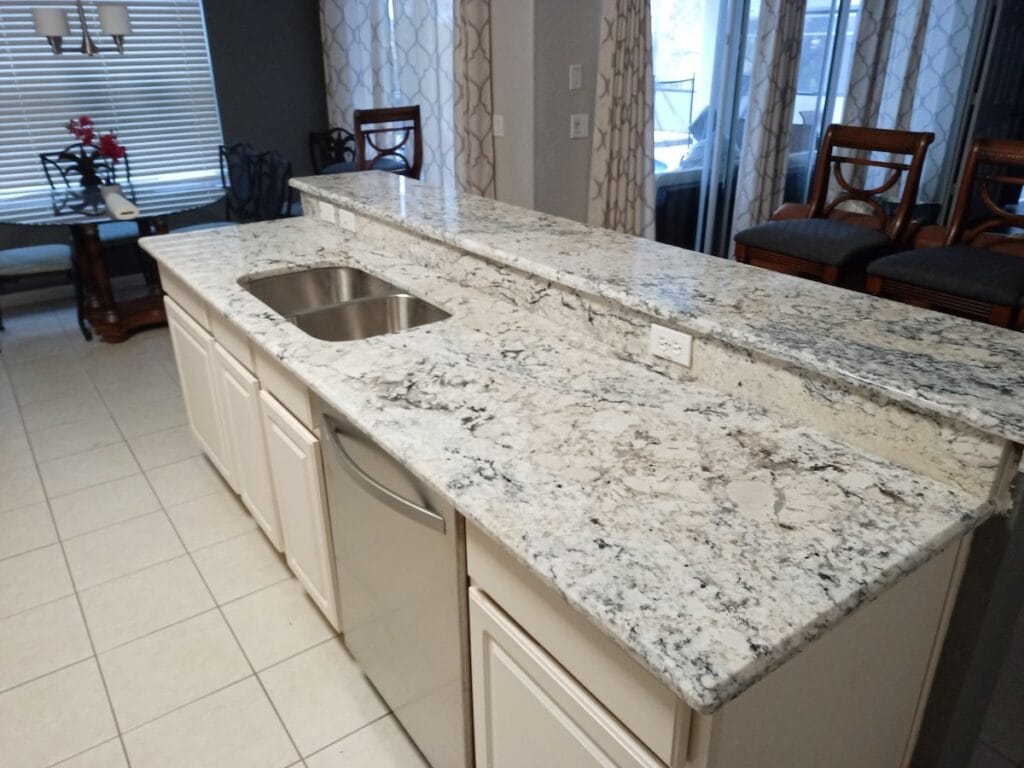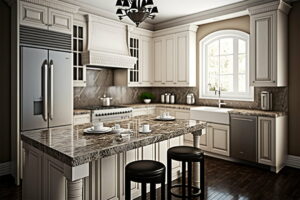Choosing the right countertop material can be a daunting task for homeowners. With a plethora of options available, it’s easy to feel overwhelmed.
Among the myriad of choices, two stand out: granite and quartz. These materials have become a favorite among homeowners, and for good reason.
Granite and quartz countertops offer a blend of beauty, durability, and longevity. They can transform a kitchen from ordinary to extraordinary.
But what makes these materials so popular? Why do homeowners often find themselves torn between quartz and granite when renovating their kitchens?
This article aims to answer these questions. We will delve into the world of granite and quartz countertops, exploring their benefits and why they are often the top choice for kitchens.
We will compare granite vs quartz countertops, highlighting their strengths and weaknesses. This will help you make an informed decision when choosing the best countertops for your kitchen.
Whether you’re a homeowner planning a kitchen renovation, an interior designer seeking inspiration, or simply curious about countertop materials, this article is for you. Let’s embark on this journey to discover why granite and quartz countertops are a homeowner’s favorite.

Introduction
Granite and quartz countertops have revolutionized kitchen design. They offer stunning beauty and reliability, making them a sought-after choice for many. For years, homeowners have turned to these materials for lasting appeal.
The debate of quartz countertops vs granite is perpetual, each with its own advocates. Both boast unique advantages, which can make choosing one quite a challenge.
Granite, a natural stone, captivates with its organic charm and unique patterns. Each slab is like a fingerprint, one-of-a-kind with no two pieces alike. It’s formed over millennia from cooling magma, adding a touch of ancient history to your home.
Quartz, on the other hand, is engineered for perfection. It’s composed of natural quartz crystals mixed with resins, resulting in a product that’s both robust and versatile. It offers a wide variety of color options and uniform patterns, catering to modern design sensibilities.
Both materials can enhance the value and aesthetics of a home. They are often seen as investments rather than mere decor choices. Choosing between granite or quartz countertops boils down to weighing their unique traits against personal tastes and kitchen needs.
Overview of Granite and Quartz Countertops
Granite countertops are loved for their uniqueness. Each slab showcases distinct colors and veining, reflecting the natural world. This singularity makes granite a top choice for those looking for a unique kitchen statement.
Quartz countertops, in contrast, offer consistency. Manufactured to meet design preferences, they provide a uniform look across all pieces. This predictability makes them ideal for homeowners looking for a cohesive aesthetic.
The decision between granite vs quartz countertops often rests on these core attributes. Granite offers natural charm, while quartz provides engineered perfection. Each has its appeal, catering to diverse style needs in a home.
Popularity in Modern Kitchens
Modern kitchens demand materials that marry style with function. Granite and quartz have emerged as favorites in this quest. Their enduring quality suits the busy, often messy, kitchen environment.
Quartz or granite countertops do more than serve as practical surfaces. They complete the kitchen, turning it into an inviting space for both cooking and gathering. This dual role underlines their enduring popularity.
Moreover, these materials have adapted to modern design trends. Granite adds warmth with its organic feel, fitting well in traditional and rustic kitchens. Quartz, sleek and versatile, complements minimalist and contemporary designs effortlessly. This versatility ensures their place in the ever-evolving world of kitchen design.

Reason 1: Durability and Strength
Granite and quartz are renowned for their strength. This makes them ideal for kitchen countertops, which face daily wear and tear. Both materials can handle heavy use, ensuring long-lasting performance.
The durability of these countertops is a major attraction for homeowners. Granite, a tough natural stone, withstands high temperatures and daily use effortlessly. Its heat-resistant properties make it perfect for busy kitchens.
Quartz is equally resilient but slightly more durable. Thanks to its engineered makeup, quartz offers added protection against everyday kitchen hazards. This extra toughness is a key consideration for those seeking durability.
Comparing Material Hardness
Hardness is a vital aspect when choosing a countertop. Granite ranks high on the Mohs scale, making it resistant to many scratches and everyday impacts. Its natural strength is one of its most appealing features.
Quartz, composed of one of Earth’s hardest minerals, is even harder. Its engineered composition enhances its resilience. This makes quartz a preferred option for households with heavy kitchen traffic.
Both materials provide exceptional durability, but their different compositions mean different strengths.
For instance, granite’s mineral makeup gives it unique resilience. Quartz, meanwhile, offers uniform hardness throughout, providing consistent strength.
Resistance to Scratches and Chips
Granite countertops can withstand considerable force before showing signs of wear. This makes them a great option for high-traffic kitchens. However, they may develop minor chips over time due to their natural formation.
Quartz offers superior resistance to both scratches and chips, thanks to its uniform structure. Its non-porous surface is less likely to crack or stain. This feature provides peace of mind for busy households.
Despite granite’s hardy nature, quartz’s engineered design gives it an edge. It remains pristine longer under harsh conditions. Homeowners favor this reliability, particularly in homes with children or frequent gatherings.
In summary, both granite and quartz stand strong against kitchen stresses. Each material offers unique strengths, making them both valuable assets in any kitchen setting. Whether you favor granite’s rugged charm or quartz’s polished durability, rest assured of their dependable performance.
Reason 2: Aesthetic Appeal
The aesthetic allure of granite and quartz countertops is undeniable. Both materials elevate kitchen design with their stunning visuals. Homeowners often choose them for the unique charm they bring to any space.
Granite offers a slice of nature in your kitchen. Its intricate patterns and deep colors are naturally captivating. These characteristics make it a focal point in any room.
Quartz, on the other hand, provides sleek and consistent beauty. Its engineered nature allows for a vast palette of colors and textures. This flexibility makes quartz a versatile choice for diverse design needs.
When selecting a countertop, the visual impact is a top priority for many. Here’s a comparison:
- Granite’s Natural Beauty: Unique patterns, deep earth tones, and an organic feel.
- Quartz’s Modern Flair: A wider color range, uniform appearance, and sophisticated finish.
- Versatile Design Options: Both materials support custom shapes and edges to match your style.
With either material, you can seamlessly create the kitchen of your dreams. They both work well in various design schemes, from rustic to contemporary.
Variety of Color Options
Granite offers a wide array of natural colors. Each slab differs, ensuring a one-of-a-kind look for your kitchen. This uniqueness adds an exclusive touch that many homeowners admire.
Quartz countertops present an even broader spectrum of colors. Because they are engineered, they can match nearly any color preference. This adaptability makes quartz appealing to those looking for the perfect hue.
For those seeking a specific color scheme, quartz is the go-to choice. It integrates easily into existing decor, enhancing the overall design. Homeowners appreciate this flexibility, as it lets them personalize their space effortlessly.
Natural Patterns vs Uniform Patterns
Granite’s charm lies in its natural patterns. Formed over millennia, each slab tells a story through its markings. This adds depth and character to your kitchen, attracting those who love organic beauty.
Quartz, in contrast, offers a uniform appearance across slabs. Its engineered consistency provides a sleek and polished look. This appeals to those who prefer a seamless and tidy aesthetic.
The choice between natural and uniform patterns depends on personal taste.
Some homeowners love granite’s unpredictability, as it guarantees a unique kitchen. Others favor quartz’s modern uniformity, which delivers a clean, cohesive look.
In conclusion, both granite and quartz offer distinct aesthetic benefits. Granite provides rich, natural patterns, while quartz offers a wide variety of color and pattern options with consistent texture. Your selection will reflect your style and how you envision your kitchen’s charm and appeal.

Reason 3: Maintenance Requirements
When it comes to kitchen countertops, easy maintenance is crucial for many homeowners. Granite and quartz countertops each have unique care requirements. Understanding these can help ensure your countertop remains beautiful and functional for years.
Granite requires some upkeep. Since it’s a natural stone, sealing it periodically is necessary. This prevents staining and maintains its shine.
Conversely, quartz offers low-maintenance care. Its non-porous surface means sealing is not needed. This saves time and effort in the long run.
Here is a brief rundown of maintenance considerations:
- Granite: Needs periodic sealing, quick cleanup of spills, gentle cleaning agents.
- Quartz: Requires regular wiping, no sealing, non-porous and stain-resistant.
- Both: Avoid harsh chemicals, use trivets and cutting boards for protection.
Different homeowners prioritize different aspects of care. Some may prioritize a unique look over maintenance, while others may prefer the hassle-free nature of quartz.
Sealing Needs for Granite
Granite’s natural composition makes sealing necessary. Without a sealant, liquids can penetrate its porous surface and cause stains. Applying a sealer periodically enhances its resistance to such threats.
Sealing granite is not challenging but requires regularity. Most experts recommend resealing every 12 to 18 months. However, frequency can depend on use and the type of sealer used.
While some might view sealing as a chore, many consider it worth the effort. The natural beauty of granite, combined with proper sealing, ensures longevity and appeal. This maintenance step helps preserve the stone’s elegance and functionality.
Easy Cleaning for Quartz
Quartz countertops stand out for their low-maintenance appeal. Being non-porous means they resist stains without the need for sealing. This feature makes them a preferred choice for busy kitchens.
Cleaning quartz is straightforward. It generally involves wiping the surface with mild soap and water. This simplicity ensures it maintains its flawless look with minimal effort.
Homeowners appreciate quartz’s hassle-free nature. Not having to worry about sealing frees up time for other activities. Additionally, its non-porous surface makes it a hygienic choice, reducing the risk of harboring bacteria.
In summary, quartz’s easy maintenance is a strong advantage for many. Its stain-resistance and simple cleaning routine make it ideal for modern lifestyles. With quartz, you get durability and beauty without the upkeep headaches.

Reason 4: Value Addition
Investing in your home often raises its overall value, and kitchen countertops play a significant role in this. Granite and quartz countertops are known to enhance both the aesthetic and monetary value of a property. They are considered premium options due to their durability, appearance, and functionality.
The presence of high-quality countertops can make your home more appealing to potential buyers. People often seek out properties with updated kitchens, viewing them as move-in ready. Granite and quartz are top choices that can set your kitchen apart from others.
These materials are valued for their aesthetic appeal and versatility. They seamlessly fit into any kitchen style, whether traditional or modern. Having either granite or quartz countertops can be a selling point when the time comes to list your home.
Here’s why they are considered valuable:
- Resale Appeal: Both materials are attractive to homebuyers.
- Timelessness: Their look and feel remain stylish for years.
- High ROI: Investment in granite or quartz countertops can yield a strong return.
Impact on Property Value
Countertops are more than just workspaces in the kitchen. They are a significant factor in the perceived value of your home. The quality and appearance of your kitchen’s countertops can dramatically impact how buyers perceive your entire property.
Homes with granite or quartz countertops often sell faster and at a higher price. These materials are highly sought after, thanks to their durability and luxurious look. Granite and quartz offer an aesthetic that feels timeless and classic, appealing to a wide audience.
Buyers see the value in not having to replace or upgrade countertops immediately. The durability of these materials adds to their appeal. So, choosing granite or quartz can be a wise investment both for living and resale potential. Homeowners looking to add value should consider these countertops for significant long-term benefits.
Longevity of Material
Durability is a core characteristic of both granite and quartz countertops. This longevity means they can last for decades with proper care, which in turn contributes significantly to the home’s overall value. When homeowners invest in such durable materials, they invest in the future.
Granite is a natural stone, offering a resilience that stands up to heat, scratches, and everyday use. Each slab is unique, providing a natural beauty that remains vibrant over time. With appropriate maintenance, granite’s charm endures for many years.
Quartz, being engineered, blends strength with aesthetics. It resists scratches and stains, maintaining a pristine appearance with minimal effort. Its consistency and low upkeep ensure quartz countertops will look beautiful for decades.
Homeowners value the peace of mind that comes with knowing their countertops won’t need replacing soon. Choosing either granite or quartz not only elevates the kitchen but also supports a sustainable, long-term investment in the home.

Reason 5: Environmental Considerations
In today’s world, environmentally friendly choices matter to many homeowners. Granite and quartz countertops offer distinct environmental benefits. Understanding these can help homeowners make more informed decisions.
The processes behind granite and quartz production affect their environmental impact. Different factors, including resource extraction and manufacturing methods, play a role. These differences can guide eco-conscious homeowners in their selections.
Choosing the right countertop may reduce your carbon footprint. Both granite and quartz have unique paths from raw material to finished product. This journey influences their overall sustainability.
Many manufacturers strive to create sustainable products. Using recycled content and efficient production practices reduces environmental harm. Such approaches can make both granite and quartz more sustainable.
Consider the following environmental factors:
- Resource Extraction: Varies between natural stone and engineered products.
- Manufacturing Impact: Includes energy consumption and waste management.
- Transportation Footprint: Depends on the distance from source to your home.
Sourcing and Production Processes
Granite is a natural stone, often prized for its eco-friendly sourcing. It is mined directly from the earth with minimal processing, preserving its natural state. This method typically involves cutting and shaping the stone, reducing the need for chemical processing.
The primary environmental concern with granite is the quarrying process. Quarrying can impact local ecosystems, but responsible sourcing minimizes this effect. Many suppliers now prioritize ethical practices to safeguard natural habitats and communities.
Quartz countertops, while engineered, have different considerations. The production process mixes natural quartz with resins and pigments. This manufacturing requires energy and resources but allows for creating a wide range of colors and designs.
Despite its more intensive production, quartz has benefits. The controlled manufacturing process can reduce waste through precision. Manufacturers can craft large slabs with fewer imperfections, optimizing raw materials. Thus, though its production is more complex, it efficiently uses resources to achieve high-quality results.
Recycled Materials in Quartz
One notable eco-friendly aspect of quartz countertops is the use of recycled materials. Many manufacturers incorporate post-consumer glass and recycled stone in their designs. This reduces waste by repurposing materials that would otherwise end up in landfills.
Using recycled content in quartz countertops contributes to sustainability without sacrificing quality. The final product remains strong and visually appealing, meeting both aesthetic and functional expectations. This approach not only reduces waste but also supports a closed-loop system within the industry.
Incorporating recycled materials can also lead to innovative designs. Unique combinations of recycled elements give each slab distinctive patterns and textures. These features enhance the countertop’s appeal while promoting environmental responsibility.
Homeowners seeking sustainable options may find quartz appealing due to these practices. By selecting countertops that use recycled content, you support eco-friendly solutions. Such choices demonstrate a commitment to the environment, without compromising on performance and style.
Conclusion
Choosing the right countertops is crucial for kitchen renovations. Granite and quartz both offer unique benefits, appealing to different homeowner needs. By understanding these benefits, you can make a more informed decision that complements your lifestyle and enhances your home.
Both materials excel in durability and aesthetics, making them preferred choices. They contribute to the beauty and functionality of your kitchen while increasing property value. Whether you opt for the natural beauty of granite or the engineered elegance of quartz, both options bring lasting quality to your space.
The environmental impact of your choice can also be significant. Considering the sourcing and production processes is vital for eco-conscious homeowners. This ensures your investment aligns with your values, offering peace of mind alongside style and practicality.
Summary of Benefits
Granite and quartz countertops provide strength, beauty, and value. Granite offers natural patterns and heat resistance. Quartz provides uniform appearance and stain resistance.
Both materials enhance kitchen aesthetics while offering longevity. Their durability and low maintenance make them practical. Opt for either, and you’ll enjoy a beautiful, functional kitchen.
Making the Right Choice for Your Kitchen
Your kitchen deserves the best, and your choice should reflect your needs and preferences. Assess your kitchen’s use and design goals to decide between granite’s natural allure and quartz’s modern simplicity.
Consult design professionals to ensure your choice matches your vision and lifestyle. Ultimately, your countertop should add value and joy to your home. With the right information, you can confidently choose the material that best suits your kitchen.





